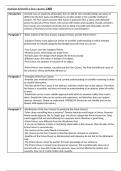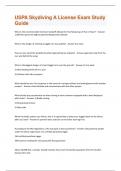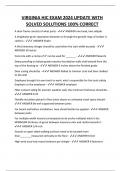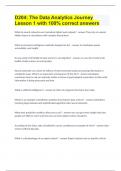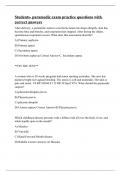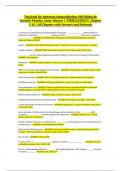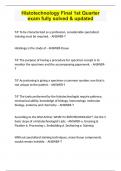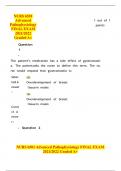Analyse Aristotle’s four causes. [40]
Introduction Aristotle was an empiricist philosopher born in 384 BC who classified things per genus et
differentia (by their types and differences), an idea similar to the scientific method of
analysis. His Four Causes assumes that nature is purposive (has a telos), and ultimately
posits the idea of a Prime Mover, who works with motion and causality. Overall, Aristotle’s
Four Causes are somewhat convincing, due to being accessible and observable, but the
reliance of his theory on the senses undermines its convincingness.
Paragraph 1 -Short outline of the Four Causes, Category Theory and the Prime Mover:
-Category Theory: Early approach similar to scientific understanding in which Aristotle
posited that we should categorise knowledge based off what we can see.
-Four Causes: uses the Category Theory.
-Material Cause: what things are made from.
-Formal Cause: the design which shapes the formal concept.
-Efficient Cause: the maker or builder of an object.
-Final Cause: the purpose or function of an object.
-Prime Mover: uses motion, causality and the Four Causes. The final and efficient cause of
the universe, whose perfection attracts us.
Paragraph 2 -Strengths of the Four Causes:
-Aristotle uses methods similar to our current understanding of scientific reasoning in order
to classify information.
-The idea of the Four Causes is not abstract, and they involve day to day objects. Therefore,
his theory is accessible, and does not need an understanding of an abstract plane of reality
to work.
-Empiricism can be a more reliable approach with which to examine reality than reason
alone. Empiricism relies on our senses and experience, and therefore does not require
abstract concepts. Simple to understand. (PROBLEM: Senses are not reliable and can be
flawed. Will explore this below.)
Paragraph 3 -Weaknesses of the Four Causes (in particular the Prime Mover):
-Telos: does everything have a purpose? Thomas Aquinas would argue in favour, however
Hume would argue for the ‘Is-Ought’ gap. Use this to critique the Prime Mover too. Telos
could suggest that evil and suffering has a purpose and is therefore a good thing.
-Prime Mover: very different from the Abrahamic God.
-If you do not believe in telos or God being observable in the universe, then the idea of the
Prime Mover is unconvincing.
-Our senses can be easily flawed or deceived.
-We cannot use the Four Causes to describe abstract concepts or emotions.
-Qualities of the Prime Mover as disinterested and impassive do not link to the Abrahamic
God.
-The Prime Mover cannot be perfect if it lacks knowledge of our existence.
-The Prime Mover is meant to be atemporal. However, this is problematic. How can it
interact with us, how did it make the universe, how can it be affected by motion and
causality, how can it create motion and causality.
Introduction Aristotle was an empiricist philosopher born in 384 BC who classified things per genus et
differentia (by their types and differences), an idea similar to the scientific method of
analysis. His Four Causes assumes that nature is purposive (has a telos), and ultimately
posits the idea of a Prime Mover, who works with motion and causality. Overall, Aristotle’s
Four Causes are somewhat convincing, due to being accessible and observable, but the
reliance of his theory on the senses undermines its convincingness.
Paragraph 1 -Short outline of the Four Causes, Category Theory and the Prime Mover:
-Category Theory: Early approach similar to scientific understanding in which Aristotle
posited that we should categorise knowledge based off what we can see.
-Four Causes: uses the Category Theory.
-Material Cause: what things are made from.
-Formal Cause: the design which shapes the formal concept.
-Efficient Cause: the maker or builder of an object.
-Final Cause: the purpose or function of an object.
-Prime Mover: uses motion, causality and the Four Causes. The final and efficient cause of
the universe, whose perfection attracts us.
Paragraph 2 -Strengths of the Four Causes:
-Aristotle uses methods similar to our current understanding of scientific reasoning in order
to classify information.
-The idea of the Four Causes is not abstract, and they involve day to day objects. Therefore,
his theory is accessible, and does not need an understanding of an abstract plane of reality
to work.
-Empiricism can be a more reliable approach with which to examine reality than reason
alone. Empiricism relies on our senses and experience, and therefore does not require
abstract concepts. Simple to understand. (PROBLEM: Senses are not reliable and can be
flawed. Will explore this below.)
Paragraph 3 -Weaknesses of the Four Causes (in particular the Prime Mover):
-Telos: does everything have a purpose? Thomas Aquinas would argue in favour, however
Hume would argue for the ‘Is-Ought’ gap. Use this to critique the Prime Mover too. Telos
could suggest that evil and suffering has a purpose and is therefore a good thing.
-Prime Mover: very different from the Abrahamic God.
-If you do not believe in telos or God being observable in the universe, then the idea of the
Prime Mover is unconvincing.
-Our senses can be easily flawed or deceived.
-We cannot use the Four Causes to describe abstract concepts or emotions.
-Qualities of the Prime Mover as disinterested and impassive do not link to the Abrahamic
God.
-The Prime Mover cannot be perfect if it lacks knowledge of our existence.
-The Prime Mover is meant to be atemporal. However, this is problematic. How can it
interact with us, how did it make the universe, how can it be affected by motion and
causality, how can it create motion and causality.

